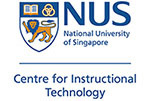The university, a place of higher learning and research, has a distinctive set of values and norms a culture. This aspect of university life is multi-faceted and pervades all disciplines in a university. As much as conveying this culture is important, there has never been a concerted and sustained effort to communicate academic culture and its importance to the entire student population.
To address this problem, an Academic Culture eModule was mooted. With the support of Vice-Provost Professor Lily Kong, CIT worked with Associate Professor John Richardson, Vice-Dean, Faculty of Arts and Social Sciences and Professor, K.P. Mohanan, Deputy Director of CDTL, as well as Associate Professor Eleanor Wong, Faculty of Law, and a committee with representatives from across the university, to come up with an online module which would eventually be available to every NUS student and also to anyone outside the campus.

A/P Eleanor Wong presenting a written case study with interactive questions.
Click for a larger screenshot.
Working closely with the Academic Team, CIT helped to analyze, design and develop the Academic Culture eModule. The content was designed primarily with the objective of providing a highly interactive and engaging learning experience. It includes videos, text notes, interactive questions, reflective exercises and discussion forums.
 A video-based scenario about plagiarism, leading to a choice for the student to make. Click for a larger screenshot. |
As Drs Richardson and Mohanan noted in July's CDTL Brief, user testing with students using a prototype of the module ensured pedagogical effectiveness and student engagement. Reactions to the prototype proved that a non-linear structure would bring more benefits. As such, this resulted in a highly modular lesson. One of the sections of Academic Culture was developed ahead of the rest. It was available as Plagiarism.NUS.
The success of this initial section assured the Academic Team and CIT that they were proceeding in the right direction. The seamlessness of the integration of Plagiarism.NUS into Academic Culture is a testament to the efficacy of the modular design.
The module has logged over 4100 visits since its launch in September. Participation in the module's discussion forum is healthy, and it provides a means for two-way communication with the lecturers. Overall, students have been positive about the Academic Culture Module. Here is some feedback from students who have engaged with it:
- This eModule uses web learning as a way to disseminate information and knowledge to students. It is effective as students can learn on their own pace. While going through the module, we can rewind to parts which we are unclear of. This is something that cannot be done during classroom learning. As such, web learning also encourages students to study independently without the scrutiny of lecturers.The guided layout of the presentation allows students to go through the tutorials systematically and orientates himself freely through the subject matter of learning. Adequate use of analogy and real life examples exhibited by the university students also give a closer sense of touch to what the students are indeed experiencing now.
- In this module, there is an emphasis on reasoning at all levels and stages in research, hence we have realized that it is vital in academic inquiry because it is through reasoning that we are able to come up with appropriate methodologies, sound justifications for our choice, as well as judicious evaluations. The steps in reasoning, though seemingly simple and straightforward, still require us to provide relevant evidences, grounds and provide sound reasoning to support our arguments. The whimsical but thought-provoking examples also showed that simple conclusions reached in a split second are achieved through a myriad of subconscious and complex reasoning steps. This stimulated us to think that many things in life we take for granted may be, in fact, be possible to refute.
- The instructional means were generally effective. The nature of the eModule allowed us to stop whenever we wished, so as to take notes without missing out on relevant information. The videos and examples provided were excellent, as most of our group members found them to be very interesting. For example, the one about the non-existence of the omnipotent made a significant impact on all of us. The clear videos and systematic format of instruction were very helpful and user-friendly.
To read the Brief and Extended Survey feedback we have received and for other statistics, please click here.
Please encourage your students to take the Academic Culture Module.
For more information about this project and for your courseware requirements, please email Mr .

